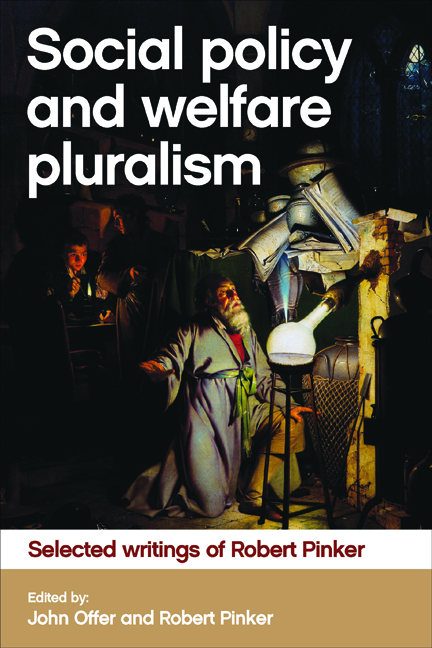Book contents
- Frontmatter
- Contents
- Acknowledgement
- Preface
- General introduction: Robert Pinker on rethinking approaches to welfare
- Introduction to Part One On social policy studies
- one The ends and means of social policy: a personal and generational perspective
- two Social theory and social policy: a challenging relationship
- three Stigma and social welfare
- four The welfare state: a comparative perspective
- five Richard Titmuss and the making of British social policy studies after the Second World War: a reappraisal
- Introduction to Part Two On social care, communities and the conditions for well-being
- six Report of the Working Party on the Role and Tasks of Social Workers: an alternative view
- seven The quest for community: from the Settlement Movement to the Griffiths Report: an historical perspective
- eight Citizenship, civil war and welfare: the making of modern Ireland
- Introduction to Part Three On welfare pluralism
- nine Golden Ages and welfare alchemists
- ten From gift relationships to quasi-markets: an odyssey along the policy paths of altruism and egoism
- eleven The experience of citizenship: a generational perspective
- twelve The right to welfare
- thirteen The prospects for social policy in the UK after the 2015 General Election
- Afterword On the post-Brexit prospects for social policy in the UK
- References
- Index
three - Stigma and social welfare
Published online by Cambridge University Press: 08 April 2022
- Frontmatter
- Contents
- Acknowledgement
- Preface
- General introduction: Robert Pinker on rethinking approaches to welfare
- Introduction to Part One On social policy studies
- one The ends and means of social policy: a personal and generational perspective
- two Social theory and social policy: a challenging relationship
- three Stigma and social welfare
- four The welfare state: a comparative perspective
- five Richard Titmuss and the making of British social policy studies after the Second World War: a reappraisal
- Introduction to Part Two On social care, communities and the conditions for well-being
- six Report of the Working Party on the Role and Tasks of Social Workers: an alternative view
- seven The quest for community: from the Settlement Movement to the Griffiths Report: an historical perspective
- eight Citizenship, civil war and welfare: the making of modern Ireland
- Introduction to Part Three On welfare pluralism
- nine Golden Ages and welfare alchemists
- ten From gift relationships to quasi-markets: an odyssey along the policy paths of altruism and egoism
- eleven The experience of citizenship: a generational perspective
- twelve The right to welfare
- thirteen The prospects for social policy in the UK after the 2015 General Election
- Afterword On the post-Brexit prospects for social policy in the UK
- References
- Index
Summary
The contribution of social theory to the field of social policy is too often one which begins in ideology and ends in rhetoric. The subject matter of social policy contains many of the most urgent problems of our time. Consequently theories and models of social welfare tend to be highly normative, explaining how men ought to behave if they wish to accomplish certain results, as discussed in Horton (1966).
Currently the two most influential theoretical formulations in social policy are based respectively on the ‘institutional’ and the ‘residual’ models of social welfare. Both models draw on historical and sociological evidence to predict future trends in social policy. The residual model rests on moral assumptions about the selfevident virtues of competition and self-help. The institutional model rests its moral case on the ethics of co-operation and mutual aid.
In both cases psychological assumptions are made about the attitudes of individuals towards welfare provision. Their common weakness is a tendency to confuse academic perceptions of social reality with those of the ordinary users of social services. There is, however, no firm evidence as yet that sizeable sections of the community are strongly committed either to the ethic of mutual aid or to the liberties of the free market. The end result for the discipline of social policy and administration is that too much is prescribed, too much indicted and too little explained.
The central and unresolved issue in this debate has been defined by Richard Titmuss as the problem of developing socially acceptable selective services within an ‘infrastructure of universalist services’ in such a way that stigma is reduced to a minimum. This approach correctly focuses attention upon the subjective realities of everyday life for those in need.
The aim of this paper is to set out a number of empirically testable hypotheses in the form of a model of social welfare. If substantiated, the model could be used to classify welfare systems in terms of their stigmatising propensities. It should then be possible to formulate a theory explaining why people are elevated or debased in exchange situations and which conditions of provision and usage are most likely to engender stigma in industrial societies.
- Type
- Chapter
- Information
- Social Policy and Welfare PluralismSelected Writings of Robert Pinker, pp. 61 - 68Publisher: Bristol University PressPrint publication year: 2017



